I spent 2 nights glamping in a 45-square-foot camper. Here are 9 things that surprised me about trying out RV life.
Monica Humphries

- I spent two nights sleeping in a tiny camper that wasn't much larger than a queen-sized bed.
- While the trip had surprising highs and lows, I loved my first taste of van and RV life.
From chatting with couples over the realities of van life to interviewing people who traded brick-and-mortar homes for a few hundred square feet, I've written what feels like countless stories about life on the road. Until May, I had never tried it myself.
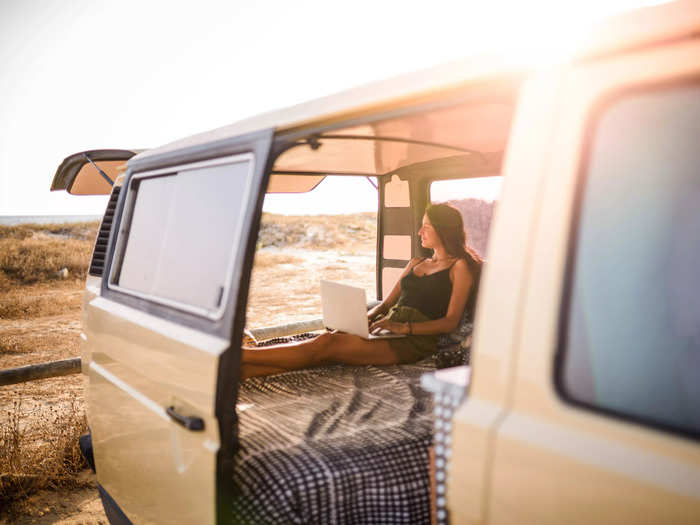
For the last two and a half years, I've interviewed dozens of people living and traveling the world in tiny vans, campers, RVs, and even things like WWII airplanes converted into homes on wheels.
After every one of those conversations, I ask myself two questions. The first is: Could I do it? My answer is always yes. But I get stuck answering the second question: Would I want to?
I love to camp, and most of my post-work Fridays involve my roommate and I playing Tetris with our camping gear in the trunk of her car. Then, we're off to remote mountain destinations, where we pitch our tent and fire up veggie dogs over a campfire. But the weekend-long trips always end with a drive back to city life.
I've always wondered what it would be like to remove that drive back home and instead continue the journey. To me, van life feels like a long-term version of camping. But I also know I've grown to rely on amenities like showers, Wi-Fi, and lots of closet space.
In May, when I traveled by train to Moab, Utah, I decided to dip my toes in van life for the first time and rent a teardrop camper for two nights.
I got my first taste of RV life when I rented a 45-square-foot camper in Utah's desert.
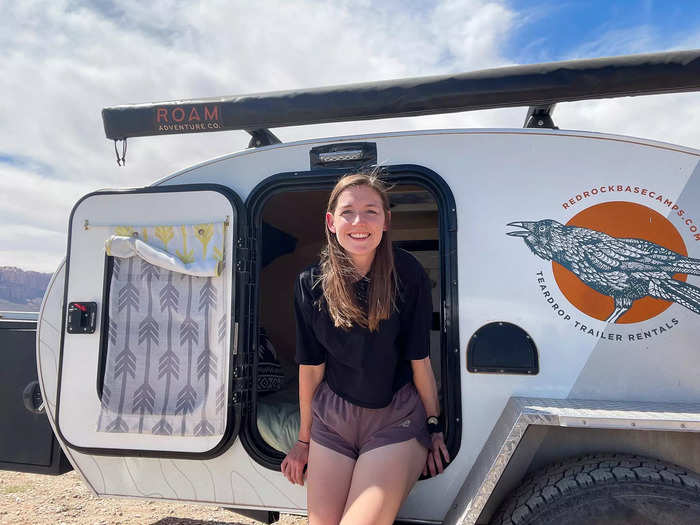
Since I wasn't sure I was ready to hop in the front seat of a van and drive across the country by myself, I thought a stationary experience would be the best way to try van or RV life.
I mapped my trip through Utah and found an Airbnb listing for a tiny teardrop camper trailer through Red Rocks Base Camps.
I booked it for $334, and the listing outlined that the Airbnb host would deliver my trailer to a nearby Moab location, which I was responsible for finding. After spotting Ken's Lake Campground on multiple travel sites, I reserved a spot there, which cost an additional $48. Insider paid for these costs, per our reporting standards.
Once my booking was confirmed, I was ready to embark on my first camper adventure.
The two nights were filled with surprises, and I drove away from the experience daydreaming of trading my monthly rent for a van payment.
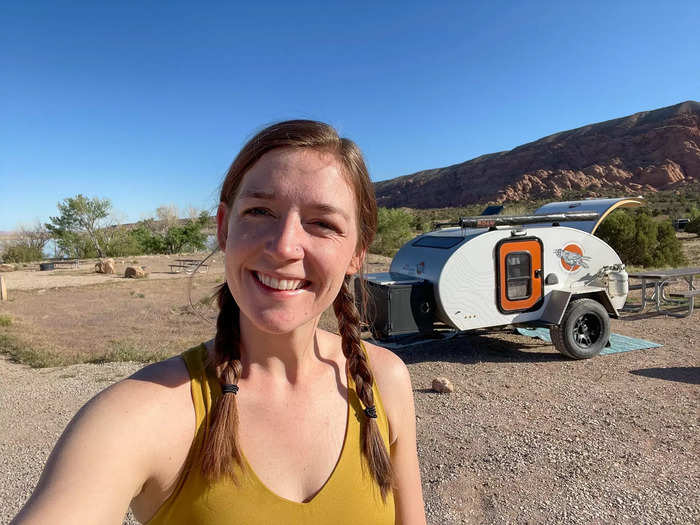
While my RV experience was about the length of my average camping trip, I did get a taste of what living and sleeping on the road would feel like.
And honestly, I loved it. I'd probably need a larger setup if I wanted to try van life with another person, but I left the two-night trip itching to embark on a longer adventure.
I knew the camper would be small, but I was surprised by just how tight 45 square feet can feel.
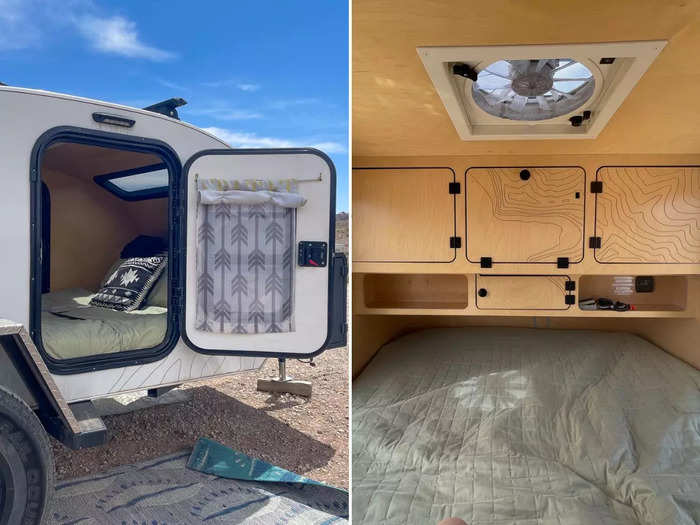
I arrived at Ken's Lake Campground and pulled up in my rental Jeep next to the trailer.
Side-by-side, I was shocked by how large my rental car looked next to the trailer.
The camper had a simple design with a door on each side. Both opened to a single room that wasn't much larger than the size of a queen bed.
There wasn't enough room to stand, so I crawled around the interior of the trailer. Above the foot of the bed was a set of cabinets for storage.
Outside the trailer, a latch lifted to reveal a kitchenette, and a cooler was stored away on the opposite side.
I thought it had almost everything I needed. The only things I spotted missing were a toilet, shower, and oven. But I was still surprised by how tiny the camper felt.
I rented the camper to have easy access to nature, but I was surprised by how connected I felt to the outdoors without sleeping in a tent.
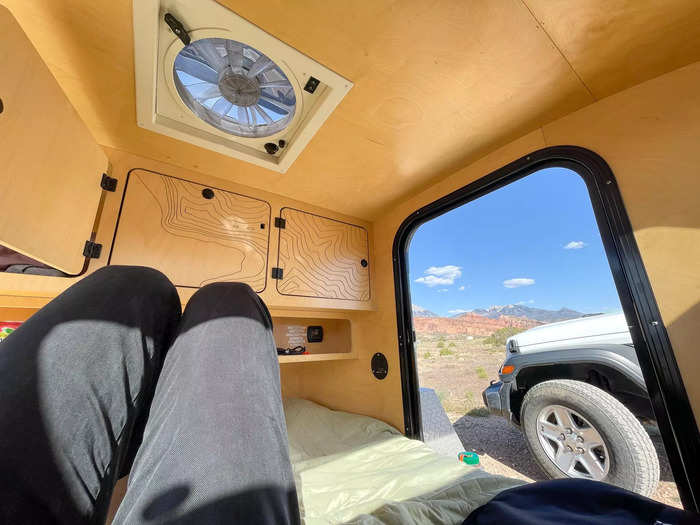
The mountains are about a 30-minute drive away from my home in Denver.
While I'm privileged to have such easy access to beautiful wilderness, I sometimes find myself opting to go for a walk in my urban neighborhood instead of hiking after work.
I rented the camper with the hopes that it would make accessing the outdoors even simpler, but I wasn't sure I'd really feel like I was in nature. I thought that to feel like I was in the outdoors, I needed to feel the hard earth under my body when I slept in a tent, or be woken up by the first sign of sunlight.
But during my three days in the camper, there was never a moment where I felt like I was indoors. When I had a short break before dinner, I simply went on a hike near the campground. When I woke up in the morning, I could kick open my camper door and admire the sunrise over the valley.
Instead of complaining about a knot in my back from sleeping on the dirt floor, I spent the entire time enjoying nature.
In just three days, I was shocked by some of the hidden costs of RV life.
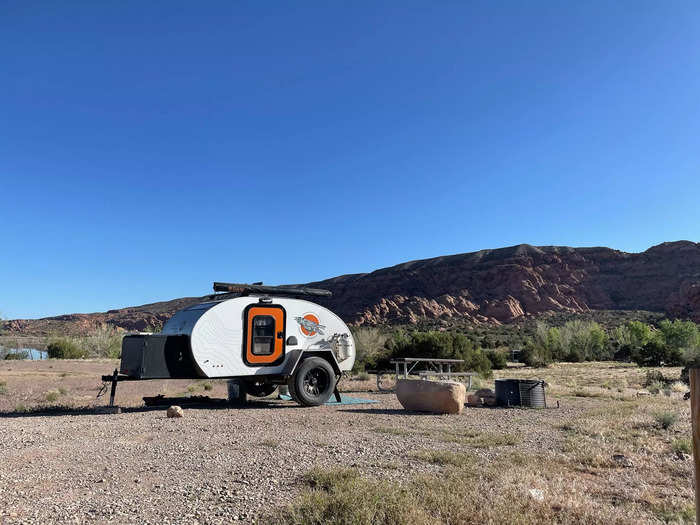
Living in a van, camper, or RV is often toted as a cheap way to live. Meanwhile, I've met other people living on the road who say they spend about the same to live tiny as they did in a traditional home or apartment.
In just two days, I learned about many of the hidden costs people might not initially consider when embracing this type of lifestyle.
The first hidden cost was my campsite. When I initially budgeted for the trip, I had only considered the price of the camper, not the cost of where I was going to park it.
While Moab has free camping sites, they were typically farther from the downtown area or didn't come with amenities like a bathroom. While some RVs, campers, and vans have bathrooms, others do not. My tiny camper lacked both a toilet and a shower.
My campsite cost $48 for two nights on top of the price I paid for my camper rental. Campsite costs would easily add up if I was planning a longer trip.
Beyond the price of the campsite, I didn't have access to a shower. A nearby recreation center offered shower access for $5. Again, it seemed like a cost that could add up over time.
I spotted similar costs I'd have to pay if I was traveling longer in a trailer. My campsite didn't have potable drinking water, so if I had used up my trailer's entire tank, I would've likely paid to refill it. Same with the propane tank that came with the trailer.
If I was finding a handful of hidden costs in just three days, I'm sure I'd discover even more if I was on the road for longer.
I was surprised to see unfamiliar storage hacks in the camper.
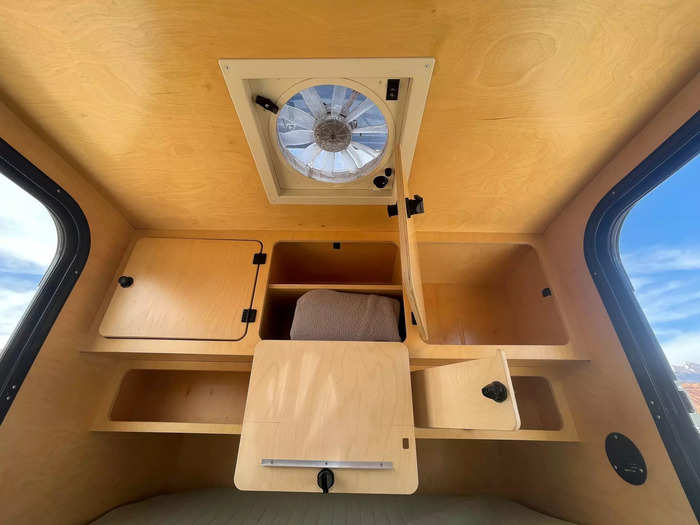
One small struggle people living in vans, campers, and RVs have shared with me is a lack of storage space and the chore of putting away all their belongings before a drive.
Since sharp turns can cause vehicles to rattle and shake, decor, kitchen appliances, and other odds-and-ends need to be securely put away where they won't fall. That often means storage bins or cabinets that close shut.
The cabinets in my little teardrop camper had a push lock that would keep them locked and closed throughout a rough drive. To me, it was a genius idea. All I had to do was push in the latch, which would either lock or release the lock.
It was something I haven't seen in the other RV renovations I've covered. In the past, I've spoken to couples who used Velcro or metal hinges to keep cabinets closed. I thought my trailer's design seemed more simple than some other cabinet lock options I've seen.
The camper was so small that my car turned into a second living space.
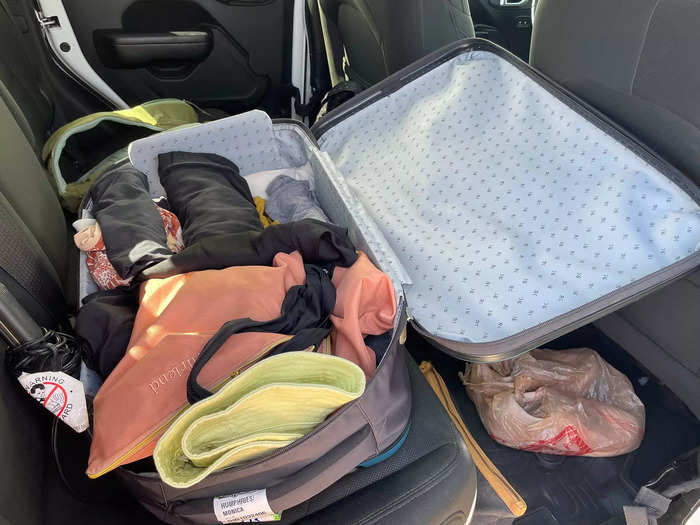
I was surprised by how many times I found myself inside my rental car instead of in the 45-square-foot camper.
It was often easier to access things from my car instead of crawling around in the camper.
Plus, I didn't want to unpack my entire suitcase for two nights. The trailer wasn't much larger than a queen mattress, so there wasn't much room to store an open suitcase.
This meant that I kept my suitcase open in the back seat of my car. It wasn't a hassle, but it did make me appreciate the space of my bedroom back home a bit more.
I also didn't have a mirror in the camper. Since I didn't pack one, each morning, I hopped in the passenger seat of my Jeep and used the car's mirror to apply makeup.
It was nice to have the extra space in the car, which helped me keep my camper tidy and organized for the three days.
It also made me realize that I'd either need a larger setup or a better storage system since I'm sure my car would've gotten messy if my trip was any longer.
The tiny camper's kitchen setup was impressive. I didn't expect that I'd be able to cook almost any meal my heart desired.
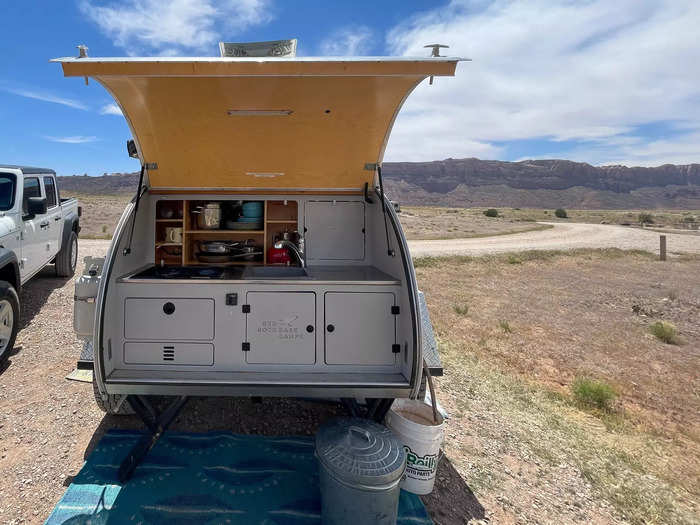
When I travel, I almost always expect to eat out. It's easier to order from local restaurants than to predict what equipment the kitchen in my hotel, Airbnb, or rental property might have.
Since a camper was even tinier than most hotels I've stayed in, I didn't expect an elaborate kitchen setup. The Airbnb listing had images of breakfasts complete with coffee, eggs, avocado, and sweet potatoes, but I was skeptical.
I was surprised by how accurate the listing was. When I arrived, I found an outdoor kitchen at the back of the camper with a sink and running water, multiple burners, pots and pans, colanders, cutting boards, knives, spices, a kettle, a French press, plates, bowls, cups, and silverware.
On the opposite side of the camper was a cooler where I could store any perishables. The only thing missing was an oven.
I, unfortunately, didn't cook anything since I wrongly assumed the tiny space meant I'd have to sacrifice my love for cooking. Next time, I'm packing groceries.
I learned I love glamping and was stunned by how painful it was for me to retreat back to my tent a weekend later.
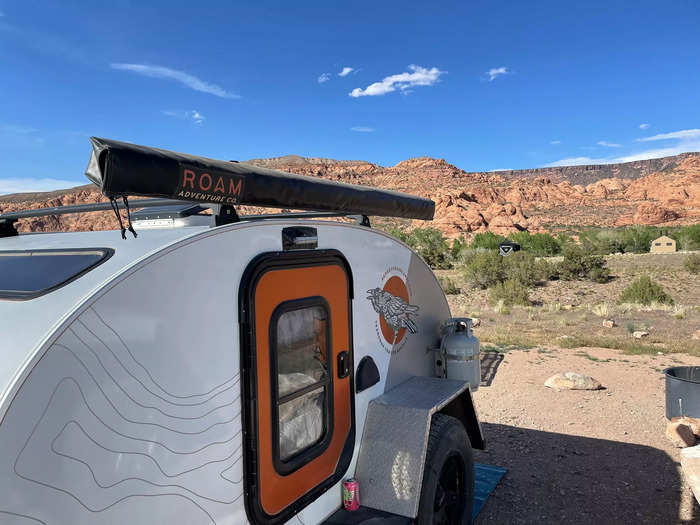
Beyond being in the outdoors, I love the ingenuity camping sometimes involves. It's fun brainstorming a way to fix a tent when a pole is broken, or finding a creative spot to hang my hammock with few trees in sight.
RV, vans, and campers on the other hand are all a form of glamping, and I initially feared that the ease of having amenities like a mattress and running water might take away from the overall experience.
After three days, I don't think it did. I still navigated small obstacles like battling Utah's winds, which sent rugs and chairs flying across a field, and figuring out how to use the propane stove.
Since the challenges felt smaller, I realized that glamping would be a much more sustainable way for me to travel and explore for a longer period.
The following week, I missed my little trailer as I fell asleep in my tent on a thin sleeping pad.
Moab's desert was so hot that I kept my windows and doors open, which eliminated any sense of privacy.
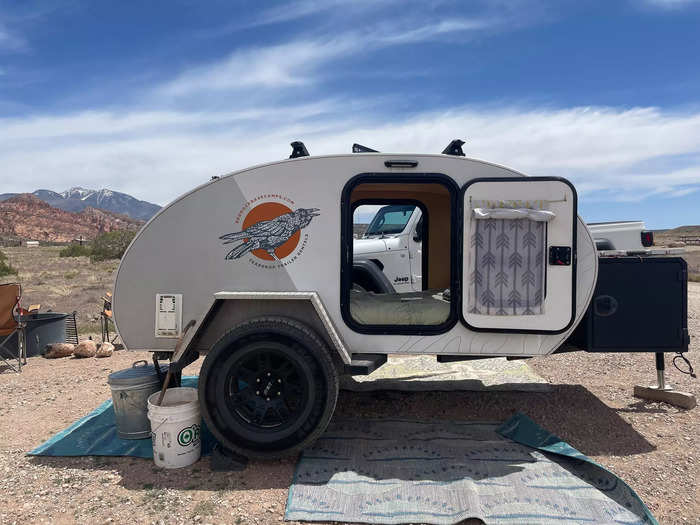
I originally assumed that a camper would offer more privacy than the sheer walls of my tent, but that wasn't the case since fluctuating outside temperatures directly impact the temperature in a tiny camper.
After I disembarked the Rocky Mountaineer train and settled at my campsite, I had a few hours before my reservation in Arches National Park. After an early morning, I decided a nap was in order.
I crawled into the queen-sized mattress, shut both doors of the camper, and almost instantly started sweating.
The trailer didn't have AC, and even with the windows and rooftop vent open, it still wasn't enough to keep the small space cool. I found that maximizing airflow was key in the camper, and opening both doors allowed a light breeze to pass through.
Initially, I thought it was a little jarring to fall asleep in the middle of a busy campsite with both my camper's doors wide open. But it also wasn't much different than sleeping in my tent, which has no locks and see-through walls.
I realized that if I want complete privacy in nature, I need to head to more remote camping sites, especially in warm climates.
Finally, I was surprised by how quickly I adapted to life in the camper.
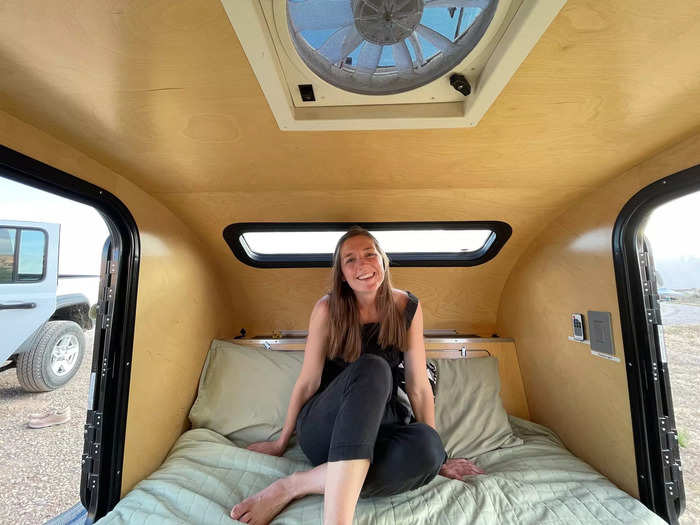
Between the tiny space and lack of AC, I thought it'd take me a few days to adjust to living in the camper.
However, the entire trip felt natural to me.
I didn't face major hurdles that most people living on the road face like hunting for Wi-Fi or driving to new locations, but I did get a taste of what it could be like to live in a tiny space while traveling the country.
While this was my first taste of van life, I'm sure it won't be my last.
Popular Right Now
Popular Keywords
Advertisement